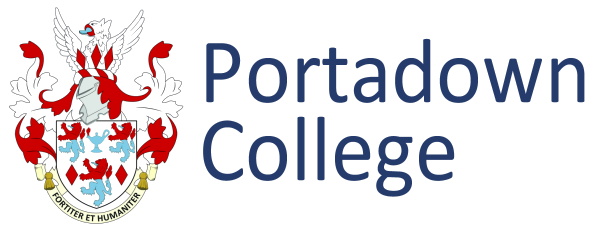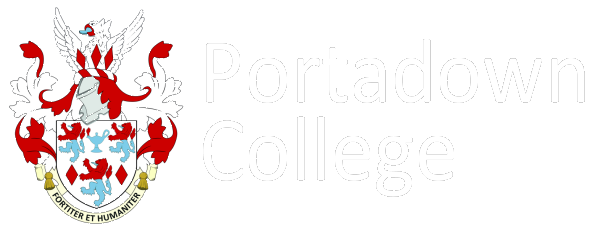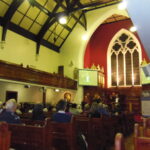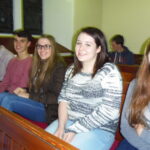Mrs Speers (Head Of Department)
Mr Wright
Religious Studies
Religious Education is a core subject in Portadown College and plays a leading role in our students’ spiritual, moral and social development. It involves the academic exploration of beliefs and values and enables students to get a broad look at how religion and spirituality form the basis of our culture. We aim to make the subject relevant and dynamic and a key emphasis is placed on religious and ethical issues in the media and contemporary society.
Our aim is that students will develop an awareness of the Christian faith, as well as an appreciation of other beliefs. We encourage students to appreciate their own religious values and traditions whilst respecting the traditions of others.
Through Religious Education students can develop marketable skills and aptitudes including:
- Analytical and strategic thinking
- Critical judgement
- The ability to work with abstract ideas
- An ability to ‘understand both sides’
- Problem-solving skills
- An appreciation of human diversity and belief
The Department has a track record of academic success and aims to promote in students the desire to reach their academic potential. A strong emphasis is placed on the pastoral care of each student and on preparing students for life beyond the classroom.
Content
‘Christianity (or Religion), if false, is of no importance. If true, of infinite importance. The only thing it cannot be is moderately important’. C.S.Lewis
At GCSE we study the origins of Christianity and debate the key ethical issues in society: abortion, euthanasia, relationships and the death penalty. Religion plays an important role in our society and can influence what people think, feel and believe. Through studying Religious Studies, students get a broad look at how religion and spirituality form the basis of our culture.
At A-Level we study Philosophy & Ethics in which we examine the big questions: Is there a God? How can God coexist with suffering? Can you believe in Genesis and Evolution? Would the world be a better place without religion? Is there Life after Death?
GCSE Religious Studies
GCSE Religious Studies is a core subject taken by all students in Years 11 and 12.
Examination Board: CCEA
What is GCSE Religious Studies about?
Religious Studies explores key events in the life of Jesus and examines their implications for today. It covers beliefs and practices within the Christian Church. Students will consider a range of important ethical issues including euthanasia, capital punishment, bioethics, war and peace and abortion. Religious Studies enables students to get a broad look at how religion and spirituality impact on the world we live in. It helps students develop marketable skills and aptitudes including analytical and strategic thinking, the ability to work with abstract ideas and problem-solving skills. Student learning in the subject has been greatly enhanced through study trips to Auschwitz and Rome.
What will I study and how will I be assessed?
| Content | Assessment | Weighting |
| Unit 3: The Revelation of God and the Christian Church | External Examination: 1 hour 30 mins | 50% |
| Unit 6: An Introduction to Ethics | External Examination: 1 hour 30 mins | 50% |
What can this subject lead to?
Religious Studies is an excellent preparation for a wide range of university courses. It develops the skills to analyse and assess arguments, and to reflect, discuss and debate the fundamental issues (i.e. ‘the big questions’). The skills learnt are essential for any future education or employment. The application of philosophical and ethical ideas to practical moral issues (like abortion, euthanasia or holy war) can be especially relevant for those considering careers in law, the media, business and teaching or religious leadership.
We follow the CCEA Revised Curriculum course and complete two modules at the end of Year 12. Each module is worth 50% and each module is examined in a paper lasting 1hr 30 mins.
There is no controlled assessment or coursework in G.C.S.E Religious Studies. Discussion and debate are encouraged as 50% of the marks in both papers are for evaluation.
Religious Studies
Examination Board: CCEA
What is A Level Religious Studies about?
GCE Religious Studies offers an academic approach to the study of religion, ethics and philosophy. This subject is likely to appeal to students who enjoy discussing and critically evaluating contemporary philosophical issues such as the existence of God or an afterlife and the problem of evil. Within Ethics students will examine the relationship between religion and morality and focus on a range of ethical theories including Utilitarianism, Situation Ethics, and Deontology. These theories will be applied to modern ethical dilemmas such as abortion, euthanasia and medical ethics. Students taking this subject should be confident with extended writing as essays form the basis of the examination.
What will I study and how will I be assessed?
| Content | Assessment | Weighting |
| AS 7: Foundations of Ethics with special reference to issues in Medical Ethics | External Examination: 1 hour 20 mins | 50% of AS / 20% of A-Level |
| AS 8: An Introduction to the Philosophy of Religion | External Examination: 1 hour 20 mins | 50% of AS / 20% of A-Level |
| A2 8: Global Ethics | External Examination: 2 hours | 30% of A-Level |
| A2 8: Themes in the Philosophy of Religion | External Examination: 2 hours | 30% of A-Level |
Are there any particular qualities or skills I should have to study this course and to what kind of careers can it lead?
Religious Studies is an excellent preparation for a wide range of university courses. It develops the skills to analyse and assess arguments, and to reflect, discuss and debate the fundamental issues – ‘the big questions’. The skills learnt are essential for any future education or employment. The application of philosophical and ethical ideas to practical moral issues (like abortion, euthanasia or holy war) can be especially relevant for those considering careers in medicine, law, the media, business and not forgetting teaching or religious leadership.
Entry Requirements: Minimum Grade B in GCSE Religious Studies.
Gallery
Rome Visit
Local Event – Has Science buried God?
Professor’s Lecture










